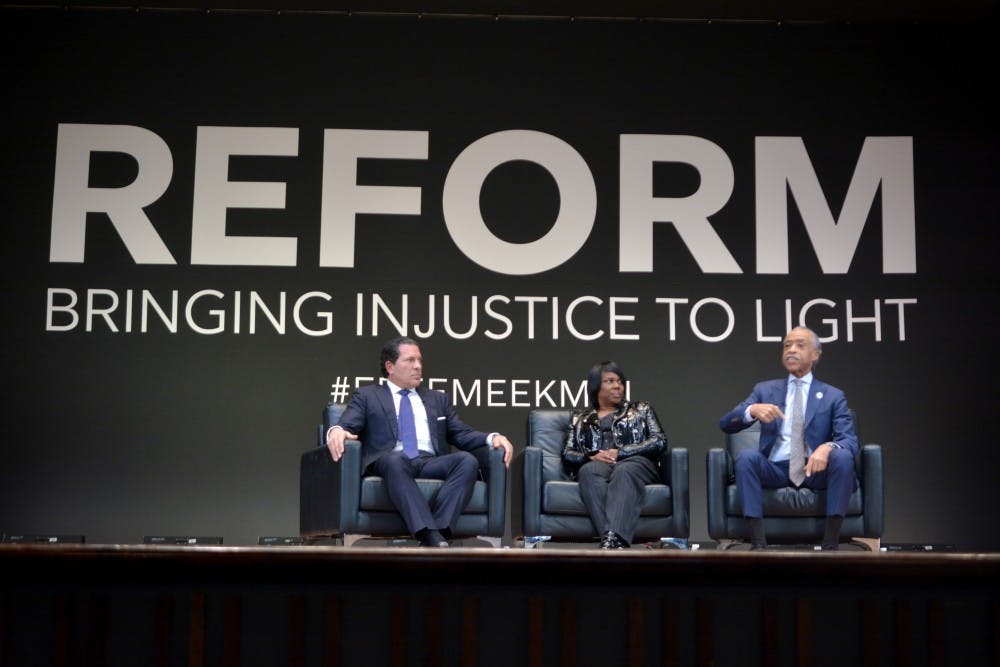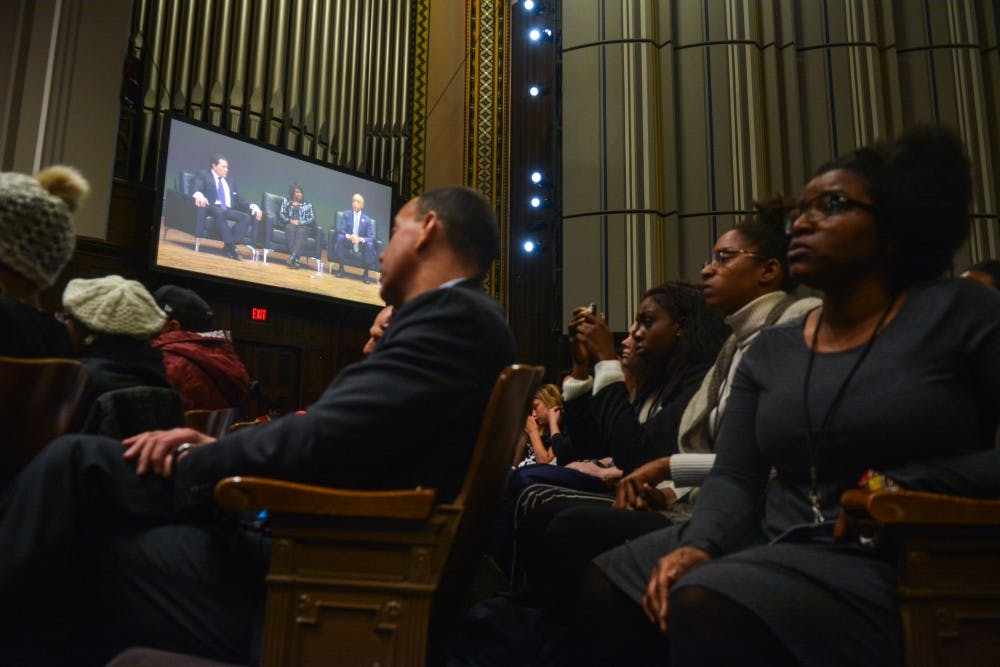
Thousands gathered at Penn on Tuesday to rally for the release of Philadelphia-native and notable rapper Meek Mill and to listen to a discussion about mass incarceration among celebrities, Mill's mother, Mill's attorney, Penn professors, and other leaders — and even Mill, who spoke briefly on the phone to the audience in Irvine Auditorium.
Several groups collaborated to organize the event, entitled "REFORM: Bringing Injustice to Light," including the American Civil Liberties Union, Mill's music label, Roc Nation, and Penn student groups like Beyond Arrests: Re-thinking Systematic Oppression.
The event was largely inspired by recent developments in the case of Mill, whose legal name is Robert Williams.
The hallmark of the evening occurred when an aide ran onto the stage halfway through the event and handed a phone to Joe Tacopina, Mill's lead attorney. As Tacopina held the phone up to a microphone and the crowd realized it was Mill, who was calling from the State Correctional Institution — Chester in Delaware County, the auditorium erupted into cheers.
“I’m just appreciative of all of the support that everyone is bringing to the table,” Mill said on the phone.
Mill, who performed at Penn’s Spring Fling in 2011, was arrested in November 2017 due to probation violations, and was sentenced to two to four years in state prison, prompting widespread outcry. His violations included a failed drug test, unauthorized travel for concert appearances, and two unrelated arrests in St. Louis and New York for misdemeanor assault and reckless driving, respectively.

Mill's probation stemmed from a 2007 arrest, after which he was convicted on seven charges relating to drugs and guns. In 2009, Philadelphia's Court of Common Pleas Judge Genece Brinkley sentenced him to 11.5 to 23 months in county jail as well as eight years probation.
His case has resurfaced in public attention multiple times since November as a result of news that the FBI had launched a review of her "conduct in connection" with the rapper since the prior year.
During a press conference before the formal event, Mill's mother, Kathy Williams, called upon Philadelphia District Attorney Larry Krasner, to "step in" and help free her son.
“This judge has been so hard on my son,” Williams said.
Several celebrities, including Michael Rubin, a co-owner of the Philadelphia 76ers, Lil Uzi Vert, a fellow Philadelphia rapper, and Malcolm Jenkins, a safety for the Philadelphia Eagles, spoke at the press conference as well.
“Meek means more to the city more than anything,” Jenkins said. “[The Eagles] are a team that embodies the spirit of city and he’s a great representation of that, and he reflects it.”

At the event, an introduction from College junior Madison Dawkins, the founder and co-president of BARS, was followed by Bryan Stevenson, the founder and executive director of the Equal Justice Initiative, opening the event by addressing racial incarceration across the United States.
“I want us to fight for Meek Mill, but I also want us to fight for all the men and the boys, and the girls and the women in jail because of injustice,” Stevenson said.
After Stevenson concluded his remarks, Tacopina, Reverend Al Sharpton, and Williams took the stage to comment on the situation.
Tacopina was the first to speak, condemning the current state of the U.S. justice system.
"I’ve never, ever, seen a case that has come close to this perversion of justice in so many ways,” he said.

Sharpton spoke next, heavily criticizing Brinkley, who is black and has been in charge of Mill's court case since his original trial more than a decade ago.
“We did not march, and go to jail, and suffer, for our people to get on the bench and look down their nose and forget how they got there,” he said to resounding applause.
Both Sharpton and Tacopina thanked Mill's mother for acting as a public figure throughout this case and the subsequent protests.

“Your mere presence here is enough. You're Meek’s face right now,” Tacopina remarked.
Following the leading discussion, prominent academics, career civil rights lawyers, and social justice advocates – including Marie Gottschalk and David Rudovsky, Penn professors of political science and criminal law respectively – discussed Williams' incarceration and the state of the criminal justice system at large.
“Things are really hard, but we are at the epicenter of criminal justice reform in the United States today, and I never thought I’d say that,” Gottshalk said.
Panelists discussed the state of the Pennsylvania justice system, in particular, noting that 50 percent of the state's prisoners are incarcerated under detainers for minor violations. They repeatedly referenced Krasner as a possible agent for sweeping criminal justice reform in Philadelphia.
While participants stressed dubious aspects of his case, they continually emphasized the larger context of criminal justice in the U.S.
“We need to make an example by walking Meek out of there so all of the Meek Mills out there will know that we are not going to tolerate this,” Sharpton said.
The Daily Pennsylvanian is an independent, student-run newspaper. Please consider making a donation to support the coverage that shapes the University. Your generosity ensures a future of strong journalism at Penn.
Donate







